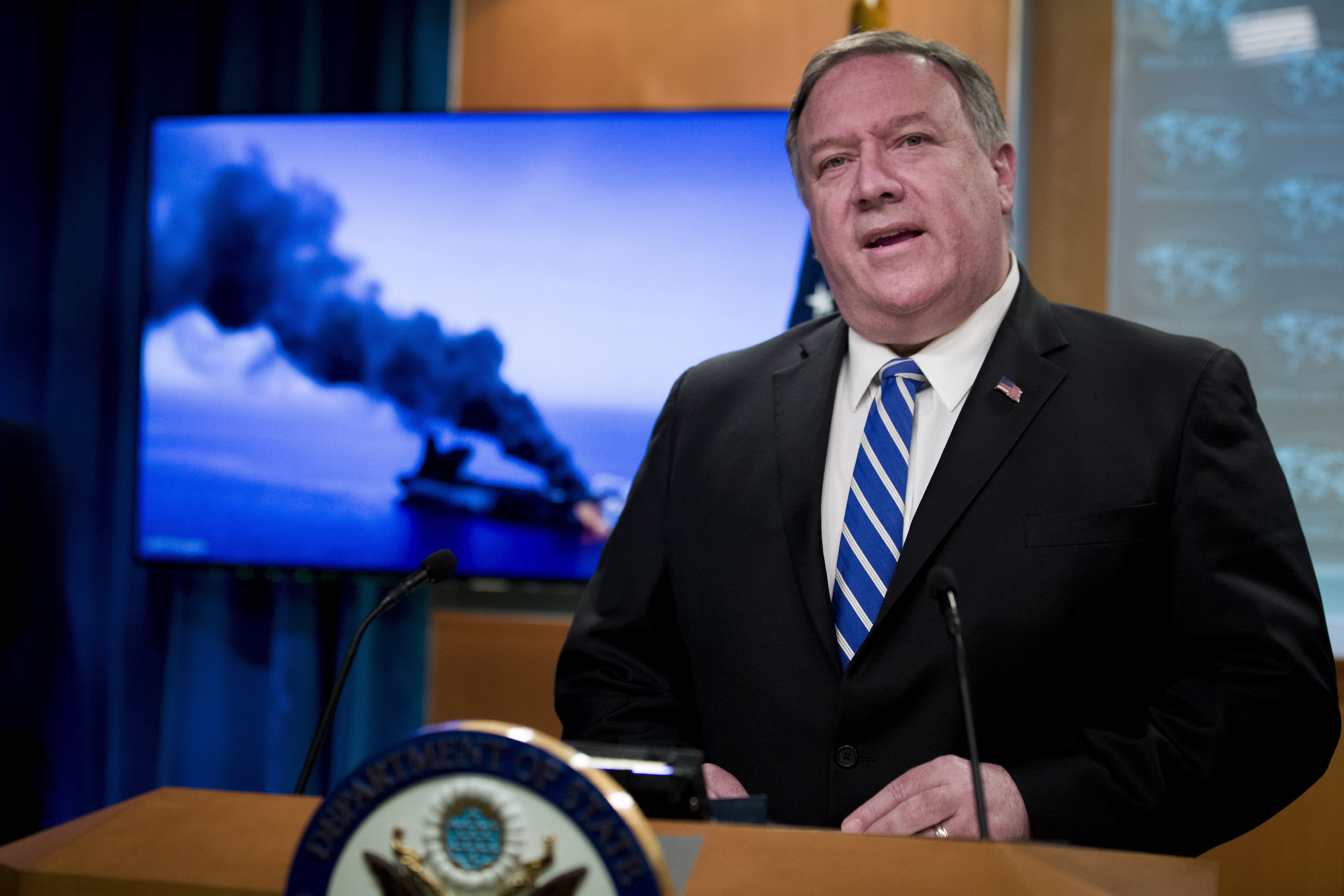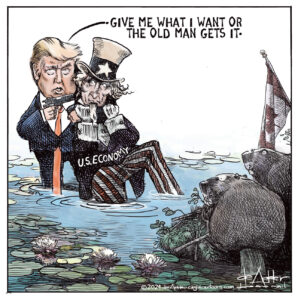The U.S. Is Only Further Isolating Itself From Its Allies Over Iran
Lawrence Wilkerson, former chief of staff to Colin Powell, assesses the Trump administration's dangerous brinksmanship in the Middle East. Secretary of State Mike Pompeo maintains that Iran is responsible for attacks on two tankers in the Gulf of Oman. (Alex Brandon / AP)
Secretary of State Mike Pompeo maintains that Iran is responsible for attacks on two tankers in the Gulf of Oman. (Alex Brandon / AP)
What follows is a conversation between Colonel Lawrence Wilkerson and Marc Steiner of the Real News Network. Read a transcript of their conversation below or watch the video at the bottom of the post.
GREG WILPERT It’s The Real News Network and I’m Greg Wilpert in Baltimore. Iran announced on Monday that it would soon violate the 2015 nuclear agreement that it signed with the US, Russia, China, Germany, France, the UK, and the European Union. A spokesperson for Iran’s atomic energy organization said that within days, Iran will have stockpiled more enriched uranium from its nuclear power plants than is allowed under the agreement, which is known as the Joint Comprehensive Plan of Action, or JCPOA. Here’s what Iran’s spokesperson had to say.
IRANIAN GOVERNMENT SPOKESPERSON Today, the countdown to having more than 300 kilograms of enriched uranium reserves has started. In 10 days, in other words on June 27th, we will reach this target.
GREG WILPERT The spokesperson also said that Iran will not violate the treaty if Britain, France, Germany, and the full European Union follow through on promises to find ways for Iran to circumvent US economic sanctions. The Trump administration had reimposed sanctions against Iran last year, arguing that the JCPOA should be renegotiated and made much tougher on Iran, even though all parties agree that Iran has not violated the terms of the agreement. Meanwhile, sanctions against Iran are having a serious effect on Iran’s economy, especially on its ability to export oil and to import lifesaving medicines. Joining me now to discuss this latest development in the confrontation between the US and Iran, is Colonel Larry Wilkerson. He’s a former Chief of staff to Secretary of State Colin Powell, and now he’s Distinguished Adjunct Professor of Government and Public Policy at the College of William and Mary. Thanks for joining us again, Larry.
COLONEL LAWRENCE WILKERSON Good to be with you.
GREG WILPERT So this announcement about exceeding the JCPOA uranium stockpile limit comes in the midst of ever-increasing tensions between the US and Iran. And last week, you know, the US accused Iran of launching an attack on two oil tankers in the Strait of Hormuz, through which 20 percent of the world’s oil supply flows. Given this context, where do you see this conflict between the US and Iran heading now with this most recent announcement about exceeding or violating the JCPOA?
COLONEL LAWRENCE WILKERSON I think we’re looking at a tit-for-tat game here now. Iran, earlier, had said that it would do things in contravention of the JCPOA if it were provoked. I don’t see how anyone looking at the situation could say that Iran has not been provoked, and majorly so. It was particularly looking at if the sanctions were closed down on oil sales and that’s what would cause them to revisit their adherence to the JCPOA. Well, we’ve done that, and I don’t see any reason for them not to do this now, given the provocation that we’ve given them. What we’ve done really is start this game, as I said a tit-for-tat, where we do this and then Iran does that, and then so on and so forth. And in this case, Iran is just saying back to us, okay, if the Europeans aren’t going to give us some relief on sanctions, and if you’re going to continue to tighten your sanctions as much as possible, then we are going to do something that will make you think twice about that. And that is, increase, or in this case decrease, our breakout time for developing a nuclear weapon.
That’s essentially what we’re talking about here in the hopes that the United States will either relieve some pressure on the sanctions. Or, more likely, they’re hoping the Europeans will grow some courage, moral and political courage, and do what they said they would do, which is to go around US sanctions. Whether it’s with a new financial transaction system or whatever, the Europeans need to grow up and become an independent body, if you will, and do what they said they would do if they want this nuclear agreement to stay alive. It’s clearly what the Iranians said they would do. One could expect him to do it. And ultimately, what will happen here, of course, is if none of this works is Iran will gradually work its way towards what we prevented with the JCPOA. That is, a nuclear weapons program. And if I were they, I would be doing the same thing given the degree of provocation that the largest economic and financial power in the world with the most powerful military has placed upon, them even to the point of lying constantly about what Iran is doing.
Let’s just examine Michael Pompeo, the Secretary of State’s, words recently. There is no doubt, he said, August 2002, Dick Cheney. There is no doubt that Saddam Hussein has weapons of mass destruction. Mike Pompeo doesn’t even have the creativity to find a new expression, a new sentence structure. There is no doubt that Iran is responsible for bumpty, humpty, humpty, you know, all kinds of provocations— firing on tankers, the war in Yemen, and so forth, and so on. So if were Iran and I were looking— and there’s no love in my heart for the Iranian leadership— but if were Iran and I were thinking rationally, and I think they are, I’d be doing exactly the same thing. I’d be threatening us back with the most potent weapon they have, which is the potential to develop a nuclear weapon.
GREG WILPERT So I’m just turning briefly to this tanker attack that you mentioned. Many US allies have also expressed doubts about the US claim that Iran was behind it or that there was no doubt about it. What are your thoughts about it?
COLONEL LAWRENCE WILKERSON It makes some sense only in the tactical realm. That is to say, if Iran is trying to pick here and pick there, you know this tit-for-tat game, it doesn’t make any sense in the strategic game. The only people it makes sense for in the strategic game are the Emirates and the Saudis. That is to say, Mohammed bin Zayed and Mohammad bin Salman who want the United States, desperately want the United States, to attack the regime in Tehran. Whether it’s a bombing campaign or a full out invasion, I don’t think they care. As others have said, Saudi Arabia is willing to fight Iran to the last dead at American. That’s what they want. So in a strategic sense, it makes every bit of sense to me that the Saudis or the UAE or their proxies, would be doing this sort of thing so that it’d be blamed on Iran. But at the tactical realm, I could see that Iran might be using some of these incidents—that’s all they are; no real damage has been done thus far— to pry the United States, to provoke the United States, to see if they can get something out of the United States.
Do they want new talks? Probably, ultimately, they do want to sit down with President Trump, but they don’t want to sit down with President Trump under any kind of conditions. Secretary Pompeo saying recently that there are no preconditions for talks, is not satisfying at all. As I’ve said before, Tehran is not Kim Jong un. Tehran does not need state verification, which is what Kim Jong un needed, by sitting down across from an American President. Tehran, thank you very much, is a state. A very historical state. A state for a long time. A very big state. It is not North Korea. Iran is going to sit down with the United States for new talks only if it is treated respectfully and well. That’s a possibility. It’s a remote possibility because of what I just said, because Mike Pompeo and John Bolton know that too and they’re not about to respect Iran to sit down. Now, the president’s a different matter. The president wants to sit down and talk and come up with a new deal. So if he can bring enough pressure to bear on his staff and is smart enough to work around that staff and to get a message to President Rouhani, for example through Oman or whomever, then we might see talks. I don’t think the president wants war. I just don’t.
GREG WILPERT Although, I would say that his advisers seem to be more intense— such as, John Bolton and Mike Pompeo— no?
COLONEL LAWRENCE WILKERSON They do, but then one wonders if that’s not being orchestrated. I know that it’s extremely difficult to imagine about this president, who has no imagination, no creativity, apparently no morals, lies all the time, and goes out and says things like, “Angela Merkel can stay in office for years and years, why can’t I? We need to change the constitution,” and so forth. This is a nut case in many respects, but in this respect, Iran and the JCPOA and a new deal, Donald Trump would take it in a heartbeat. He’d particularly take it as we draw closer to these elections, which look more and more like, even with the disarray of the Democrats, he’s going to lose.
GREG WILPERT Now, just turning again to the role of the allies. That is, Iran says it would comply with the JCPOA if European countries help Iran circumvent US sanctions. Now, meanwhile, the US is of course doing everything it can to stop Europeans from helping Iran. The main countries of Europe clearly do not want to see a war or more conflict with Iran. Do you think that they will eventually help defy the USA on the sanctions issue? And if so, what would that mean for US-European relations?
COLONEL LAWRENCE WILKERSON Well, this is a matter of serious concern. We are doing as much damage to the transatlantic relationship with Donald Trump, John Bolton, Mike Pompeo onboard in Washington, as we began to do with George Bush, Dick Cheney, Condoleezza Rice, and others in 2001, 2002, and particularly 2003 with the invasion of Iraq. Were we to somehow go ahead and make war on Iran, either by a massive bombing campaign or that followed by an invasion or whatever, I think you could look at the transatlantic link as being severed. So that’s how serious the situation we walked ourselves into now with Germany, France, England, and so forth. I don’t even see England going along with this if that scenario were to develop. So if the Europeans were to find that their equivalent GDP, their combined GDP is equivalent to ours or even slightly ahead of it, they’ve 400 million people. They are massively, potentially as powerful financially, economically, and even militarily, as we are, but they can’t get their political act together.
If this were to be the beginning of getting that political act together— that is to say, they do defy us effectively and maintain the JCPOA without us— that isolates us in a major way. It also proves to the world what the world is going to find out very shortly anyway. And that is, that Charles de Gaulle was right when he said the dollar was the most pernicious weapon America wields, and they’re going to do something about it. And the Europeans are going to be paving the way. They’re going to be showing the rest of the world that something can be done about the pernicious power of the dollar, and we’re going to have some other mechanism in the world to do financial transactions and so forth. And the dollar is going to recede as the transactional and basic currency of the world. That will hurt the United States dramatically, particularly with a $20-plus trillion national debt, and an over $500 billion annual interest payment on that debt. So these are things that are going to develop over the next few years that are going to haunt the United States, if we don’t start making better decisions.
GREG WILPERT Now finally, when Secretary of State Michael Pompeo was asked recently in Congress whether the administration would use the 2001 authorization to use military force for possible strikes against Iran, Pompeo actually ended up dodging the question. Do you think this administration would actually go so far as to ignore the authorization and initiate strikes against Iran without Congress, or might Congress still approve an authorization? How do you see the situation in that regard?
COLONEL LAWRENCE WILKERSON Well, you know, I watched this with two more, much more competent administrations. I watched it with the first Gulf War with George H.W. Bush, Brent Scowcroft, Dick Cheney, Colin Powell, and Jim Baker. And I watched as the consultations took place about whether or not to go to Congress, and only because H.W. Bush insisted that we go to Congress did we do so. We got the authorization for the use of military force there. Then, I watched it again in 2001 and then again in 2003. Of course, there was no real debate about going after Afghanistan, but there was some debate about Iraq. I have watched it since be bastardized, be used for all manner of further extension of warfare under the so-called global war on terror, and it’s about time it stopped. The Congress is becoming increasingly aware that it’s about time it stopped.
Would the Republicans in the Congress and a few Democratic allies be able to grant President Trump an authorization were he to ask for one? That’s one possibility and I don’t discount that possibility entirely. But would Trump go ahead as Pompeo suggested in his testimony recently in the Senate? Would they go ahead and say that they already have permission and do it? I don’t doubt that for a moment either, but I think the old decision by the Supreme Court in regard to Harry Truman rings a clarion call here. And that decision said— this was Truman and his action with regard to the steel strikes, as I recall— and the Justice who wrote the opinion said, when the president operates in consonance with Congress, his power is increased manifold, is very much increased. When the president operates in dissonance with the Congress— that is to say, the Congress is not going along with him— then his power is decreased markedly. So Trump’s got to consider that, and they do not have Congressional authorization. They will have to go back to Congress. If they don’t go back to Congress, they will be in deep kimchi.
GREG WILPERT Okay. Well, on that note, we’re going to leave it here. I was speaking to Colonel Larry Wilkerson, Distinguished Adjunct Professor of Government and Public Policy at the College of William and Mary. Thanks again, Larry, for having joined us today.
COLONEL LAWRENCE WILKERSON Thanks for having me. Take care.
GREG WILPERT And thank you for joining The Real News Network.
Your support is crucial...
As we navigate an uncertain 2025, with a new administration questioning press freedoms, the risks are clear: our ability to report freely is under threat.
Your tax-deductible donation enables us to dig deeper, delivering fearless investigative reporting and analysis that exposes the reality beneath the headlines — without compromise.
Now is the time to take action. Stand with our courageous journalists. Donate today to protect a free press, uphold democracy and uncover the stories that need to be told.






You need to be a supporter to comment.
There are currently no responses to this article.
Be the first to respond.